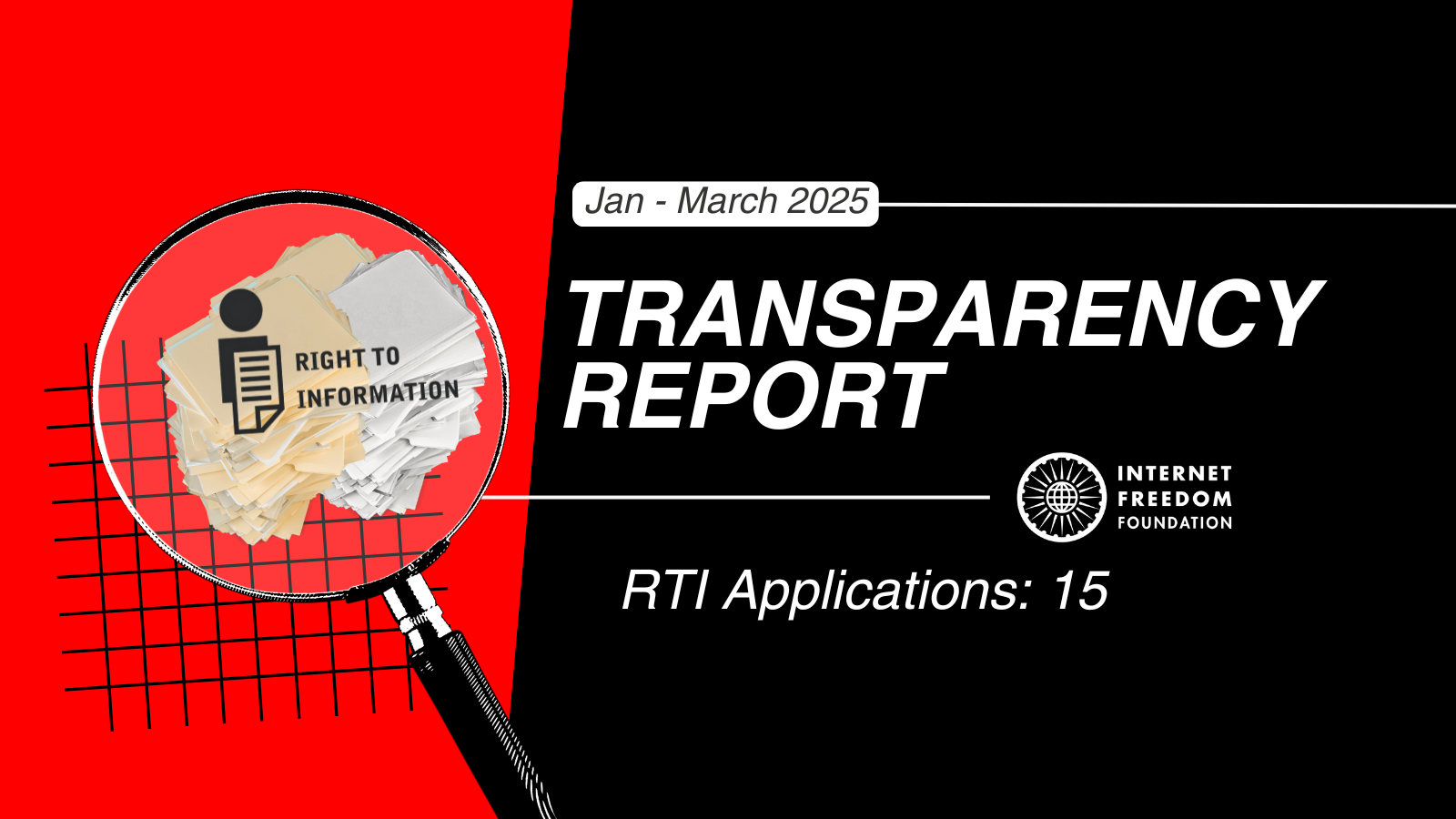
tl;dr
In the first quarter of 2025, IFF’s transparency vertical filed 15 Right to Information (“RTI”) applications with different public authorities at both the state and national levels to promote transparency and accountability in their operations while also empowering Indian citizens with pertinent information relating to their digital rights.
Some notable developments this quarter include the continued evasion of information regarding deployment of AI for surveillance, Automated Permanent Academic Account Registry (“APAAR”) ID, Digital Personal Data Protection Rules, 2025 consultation, website and content takedowns, non-transparent and vague responses for government backed surveillance projects and more.
Why should you care?
The Right to Information Act, 2005 (“RTI Act”) was established to foster transparency and accountability within public authorities by enabling citizens to access information held by these bodies. Ensuring such access is crucial to prevent democratic processes from being undermined by public authorities acting in their own interests. When transparency is not prioritised in public decision-making, citizens are left vulnerable, unable to effectively monitor and challenge potential abuses of power by these authorities.
Over the years, the RTI Act has faced significant setbacks, such as the weakening of Section 8(1)(j) through the passage of the Digital Personal Data Protection Act, 2023 (“Data Protection Act”). An amendment in the Data Protection Act amendment removed the legal foundation for allowing government agencies to share personal information in the public interest. Despite these challenges, the RTI Act remains one of the most vital tools available to the public for engaging with and demanding transparency and accountability from both Union and state governments. The Digital Transparency vertical at IFF works diligently to obtain information on various ongoing policies and public sector projects through RTI applications. The responses we receive often serve as a basis for government engagement, advocacy, and, in some cases, strategic litigation. Previous reports on our transparency endeavours can be accessed here.
RTIs filed
Here is a list of RTIs we filed this quarter:
- Local authorities in Bahraich, Uttar Pradesh recommended the cancellation of recognition of over 90 madrasas in the State based on their alleged failure to generate APAAR IDs under the Centre’s ‘one nation, one student’ initiative. The APAAR ID initiative, introduced under the National Education Policy (NEP) 2020, aims to provide students with a unique digital identity and store all their academic credentials in one place. We filed an RTI with the UP Home Department for more information on the actions taken by the authorities in the State. This included information on the rationale for the decision to recommend derecognition of the madrasas and schools, the appeal mechanism available to those affected and the law under which such actions are permitted.
- We filed two RTIs relating to deployment of artificial intelligence technologies (“AI”) across India. This included an RTI filed with the Maharashtra Home Department on the decision to deploy such technology at the exam centres during the State Common Entrance Test (“CET”). Hindustan Times reported that as part of the security measures, students were asked to undergo facial verification at exam centres before being allowed to attend the exam with the stipulation that the photograph taken must match at least 80% of that submitted during the CET application process.
Business Standard recently reported on Home Minister’s comments regarding use of AI to identify ‘mule’ accounts used by cybercriminals to store illicit funds. The Home Minister reiterated that AI will play a key role in detecting mule accounts, with efforts underway in collaboration with the Reserve Bank of India (“RBI”) and financial institutions to develop a robust tracking system. The government aims to disable such accounts before they become active. We filed an RTI with the Ministry of Home Affairs (“MHA”) to find out about the actions taken by the MHA, such as investigations or cases launched on the basis of such identification.
- The Maharashtra Government recently announced that it will set up a ‘media monitoring cell’ to monitor the news coverage related to the state government across print, electronic, social and digital mediums. According to reports, the government is to set up this cell as an independent entity to analyse positive and negative news published across print, broadcast and digital platforms. The collected information would be then analysed in order to prepare a factual report. We asked the IT Department and the Home Department, separately, for information on the powers and responsibilities of the media monitoring cell, its organizational composition and structure, and the official guidelines or framework for monitoring media content, including the criteria used to classify news as 'misleading' or 'negative’. We also asked for more information on the powers of the media monitoring cell, such as whether it would have the power to modify the content/remove/block dissemination of misleading or negative information and also information on the consequences of non-compliance with directives/orders of the media monitoring cell. Finally, we inquired about the review or appeal mechanism available to challenge such decisions of the media monitoring cell.
- In a similar vein, Times of India reported that the Goa Police, in collaboration with BITS Pilani is developing a ‘radical content analyser’ to monitor online and offline content in order to prevent extremism propaganda. According to the news report, this would result in Goa Police becoming one of the few law enforcement agencies in the country with a capability to monitor radicalisation content — both online and offline. We filed an RTI with both the Chief Minister’s Office as well as the IT Department for more information regarding the project including its specific objectives and current status.
- On January 3, 2025, the Ministry of Electronics and Information Technology (“MeitY”) released the draft version of the Digital Personal Data Protection Rules, 2025 under the Digital Personal Data Protection Act, 2023 for public consultation. IFF submitted detailed comments on the draft rules (read more here and here).
However, it is to be noted that the responses received from stakeholders on the draft Rules have not been made public by MeitY as of date. In light of this and to gather comprehensive information, we filed an RTI and asked MeitY to share an exhaustive list of all responses received by them. - The Hindustan Times recently reported that Lieutenant Governor Vinai Kumar Saxena empowered at least 23 senior Delhi Police officers to issue takedown orders to social media companies and other intermediaries in order to remove illegal content under the Information Technology Act, 2000 (“IT Act”). We filed an RTI with the Lieutenant Governor’s Secretariat for a copy of the gazette notification issued on December 26, 2024.
- In June 2020, under Section 69A of the Information Technology Act, 2000, the Government of India blocked the Shein app over data security and privacy concerns. However, in December 2024, it was reported that the Reliance Retail Ventures Limited (“RRVL”), through its subsidiary Reliance Retail Ltd (“RRL”), entered into a technology agreement with Singapore-based Roadget Business Pte. Ltd. (“Shein”) to develop an indigenous e-commerce retail platform. In response to a parliamentary question, Commerce and Industry Minister Piyush Goyal confirmed in a written reply to the Lok Sabha that Shein’s operations would be hosted on an indigenous retail platform with its infrastructure based entirely in India. He said that Shein would neither access nor have rights over the platform’s data. The Ministry of Textiles, in consultation with MeitY and the Ministry of Home Affairs, raised ‘no objection’ to the proposal from Reliance Retail. We filed RTIs with the Department of Commerce, Ministry of Textiles, Ministry of Home, and MeitY asking them for details on data protection measures in the agreement between RRVL and Shein, including specific guidelines or SOPs mandated by the government to prevent Shein from accessing Indian customer data. We also asked for certified copies of the technology agreement, related government approvals, correspondence, and meeting records.
Responses received
- In response to the RTI filed with the Lieutenant Governor’s Secretariat for a copy of the gazette notification empowering Delhi Police officers to issue takedown orders. We received a copy of the gazette notification dated December 26, 2024 issued by the Lieutenant Governor. The notification appoints Delhi Police to be the nodal agency of the National Capital Territory of Delhi, to perform functions under Section 79(3) of the IT Act. The Joint Commissioner of Police, Intelligence Fusion and Strategic Operations (“IFSO”), Special Cell is appointed as the State Nodal Officer with Deputy Commissioner of Police, IFSO as Assistant State Nodal Officer. Furthermore, Deputy Commissioner of Police of Districts, IFSO, Economic Offences Wing, Crime, Special Cell, Special Branch, IGIA, Railways and Metro as designated officers for issuing takedown orders relating to cases reported in their jurisdiction.
- The RTIs filed regarding the technology agreement between RRVL and Shein, have received no substantial response from the relevant departments. The Department of Commerce initially forwarded the RTI to the Department for Promotion of Industry and Internal Trade, which then redirected it to the Ministry of Textiles. The Ministry of Textiles, in turn, forwarded it to the Office of the Development Commissioner (Handlooms), which has responded stating that they are not directly involved with the agreement.
So, what’s next?
Well, we will continue to monitor the news closely, submit relevant RTI requests, and file first appeals as needed, while steadfastly advocating for transparent, accountable, and citizen-driven democratic institutions. We eagerly await responses to the remaining RTIs and will update you in our next quarterly report. Stay tuned for more updates!


